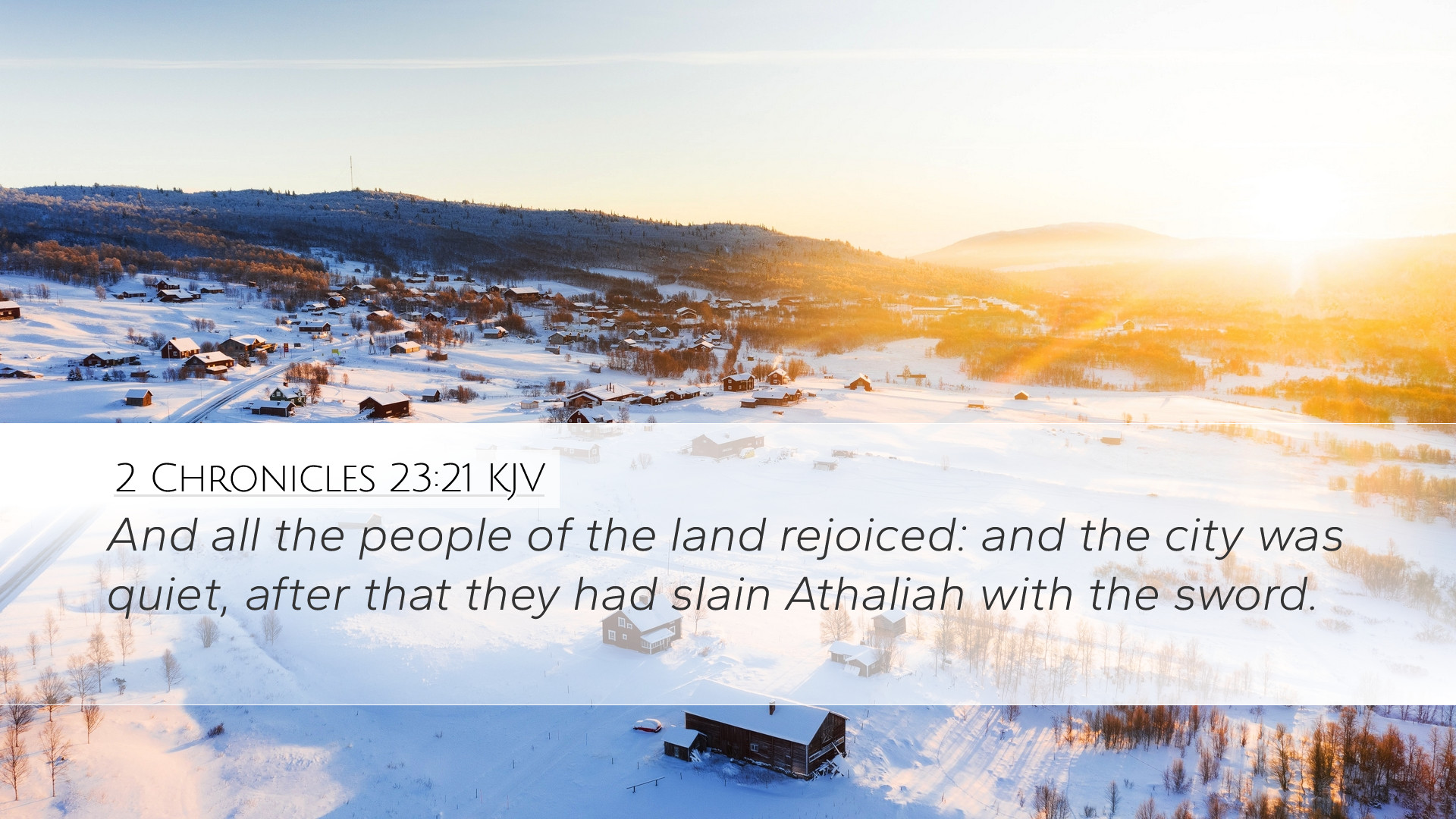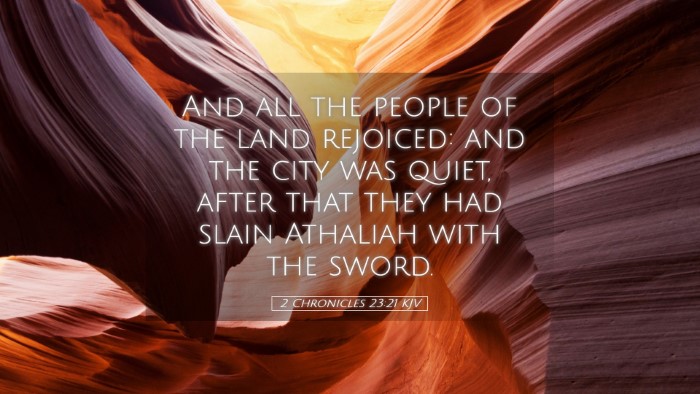Commentary on 2 Chronicles 23:21
Verse Text: "And all the people of the land rejoiced: and the city was quiet, after that they had slain Athaliah with the sword." (2 Chronicles 23:21 KJV)
Introduction
This verse serves as a pivotal moment in the history of Judah, marking the end of a tyrannical reign and the restoration of rightful leadership. The event occurs amidst a political and spiritual upheaval, with deep implications for the covenant community of Israel. The verse succinctly captures the collective response of the people, highlighting themes of justice, divine intervention, and the restoration of order.
Contextual Background
The context surrounding this verse is crucial for understanding its significance. Athaliah, the daughter of Ahab and Jezebel, seized control of the throne after the death of her son, Ahaziah, and sought to obliterate the Davidic line by killing all potential heirs. In this dark period, Joash, the only surviving heir, was hidden away, later to be proclaimed king. This verse concludes the account of Athaliah’s violent rule and the people's response to her removal.
Rejoicing of the People
Joy and Rejoicing: The people's joy is a profound response to the end of Athaliah's oppressive regime. Commentaries emphasize that joy often accompanies divine deliverance:
- Matthew Henry: He notes that joy among the people reflects their recognition of God's hand in their deliverance. When justice is restored, it brings a sense of peace and collective relief.
- Albert Barnes: Barnes interprets the rejoicing as a natural human reaction to the overthrow of tyranny, aligning the event with Scriptural examples where the people rejoiced after deliverance, such as at the Red Sea.
- Adam Clarke: Clarke indicates that the joy reflects a deep-seated longing for righteous governance and highlights the importance of collective happiness after an era of oppression.
Peace in the City
The mention of the city being "quiet" suggests a restoration of peace and normalcy:
- Matthew Henry: He emphasizes that the quietness denotes both physical safety and spiritual calm, as the people rejoiced in their newfound freedom.
- Albert Barnes: Barnes reflects that the peace is not merely the absence of conflict but is indicative of a community under the rightful rule of a Davidic king, fulfilling the covenantal promise.
- Adam Clarke: Clarke discusses the transition from chaos to order, suggesting that the public's relief stems from a return to divine favor through rightful leadership.
Divine Justice and Restoration
This verse encapsulates themes of divine justice, evident in how God intervenes for His people. The execution of Athaliah can be seen as a form of God’s judgment:
- Matthew Henry: He comments on the biblical principle that God does not allow tyrants to reign indefinitely but will act to ensure justice prevails.
- Albert Barnes: Barnes explains that God used human instruments to accomplish His purposes, highlighting that He often works through historical events to fulfill His plans.
- Adam Clarke: Clarke adds a theological lens, stressing the importance of righteous governance as a reflection of God's kingdom on Earth.
Theological Implications
The events in 2 Chronicles 23:21 provide rich material for theological reflection:
- Providence: The unfolding story demonstrates God's providential care, as He preserves the Davidic line and ensures the fulfillment of His covenant promises.
- Human Agency: The narrative highlights the role of human action in God's salvific plan, encouraging believers to participate actively in seeking justice and upholding righteous leadership.
- Community Response: The reaction of the people serves as a reminder of the joy and quietness that follows divine deliverance, challenging the Church to rejoice in God’s continued work in history.
Conclusion
2 Chronicles 23:21 is more than a historical account; it is a passage rich in theological depth. It serves as a reminder that God is actively involved in human history and works to bring about justice and peace. For modern readers, especially pastors and theologians, this verse calls attention to the importance of righteous leadership and the blessings that come from living in accordance with God’s plans. The joy of the people and their peaceful city symbolize the ideal community ruled under God’s authority, inviting reflection on the nature of leadership, justice, and community in contemporary times.


